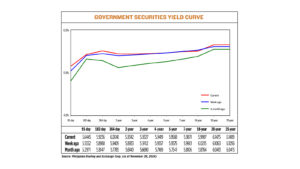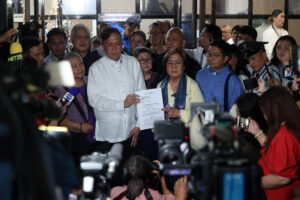Is government ignoring the law, or is it ignorant of the law?

Either way — ignoring the law or being ignorant of the law — is despicable. Ignoring the law presumes knowing the law but refusing to follow it. Ignorance of the law — not knowing the law or not knowing how it works — is sheer stupidity.
We are dealing here with how the Executive and Congress treat the Philippine Health Insurance Corp. (PhilHealth) and Universal Health Care (UHC). Recall the act of Congress and Executive to transfer P89.9 billion of PhilHealth funds to the National Government. The Supreme Court (SC) will soon decide on the unconstitutionality of the transfer. The SC has set a date for oral arguments and has issued a temporary restraining order (TRO) on the further transfer of funds (done through tranches). That’s an indication that the SC finds merit in the case.
The Universal Health Care Act (UHCA) states that PhilHealth funds cannot be transferred to the National Government, and that any funds beyond the minimum level of reserve funds must be used for the benefit of PhilHealth members. The special provision in the 2024 General Appropriations Act (GAA) that enables the transfer of the PhilHealth funds thus violates the UHCA.
Among other Constitutional issues, the said special provision in the GAA is a rider. A rider is a provision that is irrelevant to the subject or purpose of the bill. The GAA cannot amend a statute like the UHCA. The GAA is strictly about appropriations, and it cannot order an institution like PhilHealth, whose funds are strictly for its members, to transfer funds to the National Government.
The public outrage on the transfer of PhilHealth funds to the National Government and the forthcoming SC ruling on the constitutionality of the transfer should have compelled the policymakers and politicians to become prudent and rethink their position on PhilHealth.
Congress is at the penultimate stage of approving the bill on the 2025 GAA. Again, the proposed PhilHealth budget is questionable. Congress, following the Department of Budget and Management, has substantially cut PhilHealth’s budget. Here is a statement of PhilHealth President and Chief Executive Officer Emmanuel Ledesma, Jr.:
“For Fiscal Year 2025, PhilHealth initially proposed a P150.92-billion budget to cover the premiums of 25.28 million individuals under the indirect contributors, and P21.17 billion for the benefit package improvement pursuant to Section 37 of the UHC Act, totaling P172 billion. However, the Department of Budget and Management (DBM) has only appropriated P53.26 billion to cover the health insurance premiums of 14.18 million indirect contributors and P21.17 billion to improve benefit packages.”
The above quotation comes from the Transcript of Stenographic Notes of the Senate Committee on Finance hearing on the Proposed 2025 Budget of the Department of Health and Attached Agencies and Corporations, on Oct. 8.
The Senate’s proposed budget to cover the premiums of indirect contributors is even lower than what the DBM has proposed: P47.5 billion vs. P53.26 billion.
Adding fuel to the fire is that the earmarking of revenues from the excise taxes of tobacco and sweetened beverages is not being followed. Based on the law providing for earmarking and the revenue figures from excise taxes for tobacco and sweetened beverages, PhilHealth must at least receive P69.81 billion. The proposed budget amounting to P47.5 billion or P53.26 billion is obviously short of what PhilHealth must be getting from the sin taxes.
What gives?
The legislators and the public have reason to severely criticize Mr. Ledesma for the incompetence and inefficiency of the PhilHealth leadership. But slashing the PhilHealth budget is senseless and contemptible. PhilHealth members should not be stripped of their contributions and the corresponding benefits, using the leadership’s failure as an excuse.
Note that what Ledesma and PhilHealth submitted as proposed budget is the amount that will cover all the indirect contributors, based on the minimum premium for PhilHealth membership. But Congress and the DBM have allocated an amount that technically will exclude 11.10 million indirect contributors.
Another way to look at this is that the sustainability of PhilHealth funds and benefits is now seriously threatened. Further, it is most inequitable and iniquitous that direct contributors — many of them ordinary workers — will now shoulder a bigger share of funding PhilHealth. And so, while government is defunding PhilHealth, the direct contributors are now paying higher premium rates. The government is violating the principles of social health insurance — turning back from its role of enabling the right to health, debasing solidarity, and degrading fairness.
And contrary to the perception that PhilHealth has excess funds, a deeper inquiry into PhilHealth’s financial statements shows that the reserve funds it has — including the so-called “excess” — is not sufficient to cover insurance contract liabilities (ICL). In December 2023, PhilHealth’s reserve fund stood at P464 billion. In March 2024, the reserve fund was at P488 billion. But the ICL amounted to P1.128 billion. In other words, the transfer of PhilHealth funds to the National Government and the drastic reduction in the PhilHealth budget for the indirect contributors, together with the commitment to expand benefits, will only widen the deficit. (See the column written by Enrico P. Villanueva, “State of the PhilHealth fund: Claimed excess ignores reserve deficit and service gaps,” Nov. 4.)
The Executive and Congress will again be violating the law. Or perhaps, they are displaying their dumbness. The statement of Senator Grace Poe, the chair of the Senate Finance Committee is telling:
“Alam naman natin na ’yung PhilHealth, they were asking for about 70 plus billion. Nasa 60 plus billion sila ngayon. Pero binigyan pa rin ha. Pero ito, ’yung pinuntahan ng ibang pondo ng PhilHealth, nabigay sa MAIP (Medical Assistance for Indigent Patients) program, nabigyan din ’yung mga DoH (Department of Health) hospitals para direkta na.”
Senator Poe misses the essential point. That government must provide the premiums for all indirect contributors. To withdraw or reduce funds for the premium of PhilHealth indirect contributors is to destroy the very essence of universal healthcare. Taking away funds from PhilHealth contradicts the fundamentals of giving healthcare coverage to all Filipinos, expanding benefits and services for all, progressively reducing out-of-pocket expenses, and ensuring sustainability.
And the cat is out of the bag. PhilHealth is being defunded so the funds can be transferred to the so-called Medical Assistance for Indigent Patients program, which is but an inefficient, non-transparent, and discretionary pork barrel fund that serves a politically partisan objective. While it is understandable that politicians want a kitty for ayuda (assistance), this should never be at the expense of destroying PhilHealth and universal healthcare.
Filomeno S. Sta. Ana III coordinates the Action for Economic Reforms.




